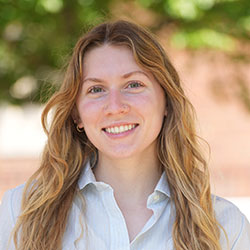Throughout the 2024 fall semester, students in Joanna Goger’s senior capstone research class at the University of Maryland, College Park, worked with NOAA Ocean Exploration
An example of litter and marine debris seen washed up along Kanapou Bay, on the Island of Kaho'olawe in Hawaiʻi. Image courtesy of NOAA Marine Debris Program.
The project built on a collaboration that began in the spring of 2024, in which students analyzed nine years of NOAA Ship Okeanos Explorer data to visualize patterns of deep-sea marine debris observed during remotely operated vehicle dives in the Atlantic.
The spring cohort found that out of 480 recorded observations, plastics and metals were the most common type of material seen. For the fall 2024 iteration of the course, students were initially asked to conduct a literature review of marine debris and marine pollution policies that focused on the deep sea and to use data gathered by the previous class to make recommendations for improvement, but soon found that very few policies specifically focused on the deep sea.
Instead, the class pivoted to a broader policy and literature review analyzing the efficacy of national marine debris policies in four geographic regions: the United States, Canada, the Caribbean, and the Pacific Islands, with a specific focus on plastics due to the prevalence of marine plastics policies. Policies were deemed “successful” if they had reached their stated primary goal(s).
The students scoured grey literature, policy databases, and government websites for policy evaluations. Ultimately, they found that common elements of successful policies included a proactive rather than reactive approach (i.e. limiting plastic availability rather than managing post-consumer waste), availability of industry alternatives to the target plastic, a thorough research period prior to the implementation of a policy, a phased approach to implementation allowing industry time to adapt, and strong support from key figures including politicians, stakeholders, and the public. Policies that did not meet their goals often included those that were too broad, lacked realistic benchmarks, or lacked proactive regulation.
During their final presentation to NOAA Ocean Exploration and NOAA Marine Debris Program staff, the students shared their findings alongside case studies from each of their four regions of interest. The students also presented their recommendations for future research, before being granted the opportunity to ask some of their own career-related questions of their NOAA mentors.
This story was originally published by NOAA Ocean Exploration.
Meet the student team:

Elizabeth Braun
Elizabeth Braun is a senior at the University of Maryland (UMD) majoring in environmental science and policy with a concentration in politics and policy. She has conducted data collection and analysis as a research assistant on a National Science Foundation-funded project focused on stormwater management in Ohio, and has served as a copy editor for The Diamondback, UMD's independent student newspaper, ensuring the accuracy and quality of published articles. She holds leadership roles as treasurer and captain of the Maryland Women’s Ice Hockey Club, and plans to pursue a career in environmental sustainability with a focus on managing waste and developing solutions to address global pollution challenges.

Caroline Burke
Caroline Burke is a senior at UMD majoring in environmental science and policy with a concentration in politics and policy. She has previously interned at the New York State Energy Research and Development Authority, where she conducted research on local municipal solar energy laws, and at the New York State Department of Public Service, where she reviewed applications for transmission lines. She has also worked with the Offshore Wind Alliance, developing a data tracking system to monitor the status of wind projects along the East Coast. In the future, Caroline aims to continue her efforts in addressing environmental issues through policy.

Sophie Coyne
Sophie Coyne is a senior at UMD, studying environmental science and policy with a concentration in politics and policy. She previously worked as a corporate sustainability intern at FedEx in Pittsburgh, Pennsylvania, where she used data analytics to compile an emissions scorecard for the company. She is involved in various organizations on campus including UMD’s professional environmental fraternity, Epsilon Eta, and UMD’s pre-law fraternity, Phi Alpha Delta. Sophie spent the fall of 2023 studying abroad in Ireland, where she had the opportunity to dive into the country’s environmental policy. Following graduation, Sophie hopes to continue pursuing her passion for the environment through policy.

Katie Garcia
Katie Garcia is a senior at UMD studying environmental science and policy with a concentration in marine and coastal management. She is the current president of Epsilon Eta, UMD’s professional environmental fraternity, where she leads collaborative efforts with fellow environmentalists to address sustainability challenges on campus and in the local community. In June 2023, she studied tropical marine ecosystems at the School for Field Studies campus in Turks and Caicos, where she learned about local marine organisms and practiced research methods for underwater data gathering. After graduation, Katie hopes to dedicate her time to marine ecosystem restoration and conservation.

Catalina Gibney
Catalina Gibney is a senior at the UMD majoring in environmental science and policy with a concentration in biodiversity and conservation biology. She is currently an intern for the U.S. Environmental Protection Agency in the Office of Ground Water and Drinking Water’s Risk Reduction Branch, supporting drinking water rule development and revision. She has experience in wet lab research and thesis development, and has previously interned with the Maryland Department of the Environment to help develop the state PFAS Action Plan, and supported ongoing federal litigation in the Environmental Enforcement Section at the U.S. Department of Justice. After graduation, Catalina plans on attending a dual master of science and juris doctor program to kickstart her career in environmental law.

Alex Utzschneider
Alex Utzschneider is a senior at UMD, pursuing a degree in environmental science and policy with a concentration in marine and coastal management. Alex has previously worked as a research assistant in the Gruner Lab, studying the invasive emerald ash borer and its impact on local populations of green ash trees. Currently, he serves as an environmental scientist for AZ-RI Consultants, where he conducts fieldwork and prepares comprehensive reports for a wide range of clients. After graduation, Alex plans to continue his work with AZ-RI and eventually pursue graduate studies in environmental science and sustainable development.